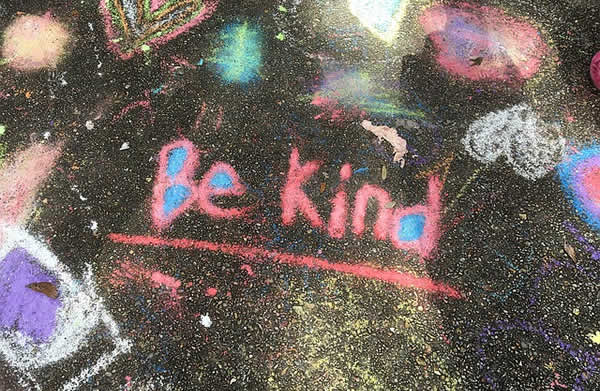Many acts of kindness we read about or see in the video clips show a person paying for someone, buying a gift, or covering a cost. Of course, in this system we live in where money is required to cover basic needs, sometimes giving money is a very kind gesture. Generosity is certainly an important factor in kindness. Other acts of kindness may include doing something for someone else, like mowing their yard, bringing dinner, doing groceries, etc. Many times this truly can be a gift. Yet, behind the desire to do something for someone or give them something, we should try to make sure that it includes valuing the person at the same time! Lots of times, the part of giving and sharing that is fun is that it requires being together. Cooking dinner for the mother of a newborn is also an opportunity to visit the mom (and baby!), for example. Giving breakfast to someone at a street corner could be an opening to ask what they’d like the next time you drive by on your morning commute.
So what about the kindness that goes beyond giving, but focuses on the connection between people? How can we work on being kind?
Often the biggest gift we can give, and the greatest kindness we can share, is being present with someone where they are and as they need. Being present and sharing in our humanity is one of the most grounding acts there is. It engenders kindness because it truly makes us shine to the core of our being with the positive social interactions that provide safety, comfort, support, and care. Yes, frequently this accompanies the typical doing or giving that we associate with kindness. But it is the aspect of being that truly makes the act transformational.
Why does this type of sharing in kindness feel so good? Kindness helps weave a tighter social fabric where life is made more full as a community. Surely there are different levels to the type of involvement between people in various interactions of kindness, and I’ve imagined some examples (and non-examples) to share.

I’ll start with the non-examples. In my personal opinion, there can be power dynamics behind being kind when it is only with money. Especially when the sharing isn’t experienced together between the people wanting to provide and receive! An example is when we give money to a person living in poverty but don’t want to make eye contact or say anything to acknowledge them. We may be contributing to a meal that day, but we aren’t contributing to our shared humanity. A related example, when people do interact and smile upon giving money, the charitable person may expect an outpouring of appreciation. (Even worse, many people hide a camera to show what a good deed they have done and to capture the response complimenting them!) This may strengthen social bonds with other people on their YouTube feed, but not with the person living in poverty! We have to remember that inequality exists not because of the inherent merit of a few but because of an unfair system of accumulation by a few. Yet sometimes our charity may not be treated as a spreading of the wealth among equals. We have to always work to be kind in a true way by connecting to our humanity in moments of generosity, and not focus only on ourselves.
Some examples! The way to respond to another person’s needs in a kind way, as an extension of giving money, can happen in many ways. Perhaps both the giver and receiver shop together to find something to eat, and maybe even eat together. Perhaps there is an exchange of a handshake or a hug or a sharing of photographs or stories. It’s important to remember it should always happen in a way that allows the receiver to be comfortable and not feel responsible for the “feel-good” of the one being generous. Shifting the focus from the exchange to the connection can be a powerful one that allows for value and agency by both parties. As a reminder, changing behavior shouldn’t be a barrier to acting with kindness! Clearly, there are examples when financial generosity also can be true acts of kindness, but it remains important to think critically to understand those moments.

